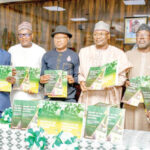The Independent National Electoral Commission (INEC) has been asked to review the processes and procedures of the current two-step process of continuous voter registration (CVR) and permanent voters card (PVC) collection to ensure that eligible voters are not disenfranchised.
The executive director of NESSACTION, Ambassador Eniola Cole, made the call yesterday in Abuja at the presentation of #YourVoteMatters project report of the 2023 general elections.
She said the processes should be merged to enhance more registrations and ease of PVCs collections for eligible citizens.
The event was organised by NESSACTION, International Foundation for Electoral Systems (IFES), United States Agency for International Development (USAID) and Foreign Commonwealth and Development Office (FCDO).
Anambra: Town unions leader raises alarm over fake N200 circulation
Insecurity: Niger farmers lose hope as new planting season sets in
“The infusion of technology into Nigeria’s electoral process creates credibility for INEC processes and procedures. However, an INEC review of the current two-step process of CVR and PVC collection is needed to ensure that eligible voters are not disenfranchised,” Cole said.
She said that ahead of Nigeria’s 2023 presidential and National Assembly elections, the organisation and its partners had sought to increase the number of PVCs collected by five per cent and increase voter participation in the election by strengthening the capacity of INEC to deliver a more inclusive voter registration and voter participation exercise through the #YourVoteMatters project.
“The six-month project sought to support 30,000 direct beneficiaries and over 2,000,000 indirect beneficiaries by leveraging on community strength and mobilisation techniques deployed to capture the target audience of women, youth, persons with disabilities (PWDs) and internally displaced persons in view of current economic realities.
“However, the project met and overshot all targets by supporting 31,712 direct beneficiaries and over 156million indirect beneficiaries through nationwide media coverage on radio, television and other mainstream media channels, using the innovative Online Data Collection and Analyses (ODCA) tool deployed,” she said.

 Join Daily Trust WhatsApp Community For Quick Access To News and Happenings Around You.
Join Daily Trust WhatsApp Community For Quick Access To News and Happenings Around You.


